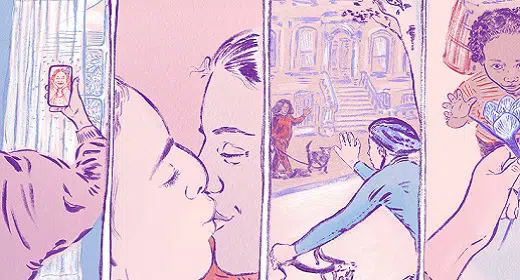by Carol Bruess PhD: Most of us intuitively know that having close, supportive relationships is important to our general happiness and well-being…
and decades of scientific research confirm that human connection not only affects our mental health but is also a key determinant to how long we’ll live and how physically healthy we’ll be during those years.
The good news: Making small changes in our relationships can yield big results.
As Robert Waldinger PhD, the director of the long-running Harvard Study of Adult Development (aka “the longest study on happiness”), says in his TED Talk, “People who are more socially connected to family, to friends, to community are happier; they’re physically healthier; and they live longer than people who are less well connected.”
And we’re not just talking about your intimate, family and spousal relationships. All types of human connection — from the social to the professional, from the people you volunteer with to the man behind you in line at the grocery store — count.
The good news: Making small changes in our relationships can yield big results. Below, I’ve pinpointed six relationship resolutions to consider that could improve your bonds.
1. Change the words you’re thinking about other people
Words matter. Not only the words we use when we speak to others, but the words we say to ourselves about others.
Our internal narrative — especially the story we tell ourselves about other people, their decisions, behaviors, quirks and irritating habits — has a profound effect on how we interact with them. When you tell yourself “they’re so controlling” or “they never listen to me” or “they’re so self-centered” before or during a conversation with a partner, colleague or sibling sets you up to be more likely to find evidence of their controlling/non-listening/self-centered behavior because you’ve primed yourself to spot it.
By creating micro-moments of positivity, you’re starting a wave of good feelings that spreads through your life and through the lives of those you encounter.
There are three simple steps you can take here. The first is to recognize when one of these judgmental thoughts enters your head that reinforces a negative narrative. Next, stop yourself from telling this story. Finally, replace it with a more positive word or phrase.
No, I’m not asking you to think something that is just plain untrue — as in “they always listen to me” or “they respect that I’m my own person.” Instead, pick a word or phrase that reminds you to show some compassion (“They’re trying their best”), acknowledge the journey you’re on (“We’re all works in progress”) or capture what you want to do more of in your relationships (“Listen — really listen”).
You’ll be surprised how quickly changing your words can also change the quality of your relationships. One of my favorite phrases, which I’ll be recommitting to in 2022, is “They might just be right.” Thinking those five words reduces my need to win arguments and can even prevent me from getting into them in the first place.
Make this phrase or word your screen saver, set a daily reminder with them or leave sticky notes with the phrase or word on the bathroom mirror, your laptop or next to the kitchen sink.
2. Create tiny moments of positivity during your day
Want to experience more connection in your day-to-day life and a healthier and more connected sense of being in the world?
Turns out, you can do this wherever you are and wherever you go. Just take five seconds to learn the name of that nice person in the orange apron at Home Depot who helped you find the particular nail you needed and tell them they made your day. Or, look your pharmacist in the eye and thank them for showing up during this challenging time, or stop by your coworker’s office and ask how her aging parents are holding up.
Indeed, whenever you share a tiny, positive moment with another human — even if it’s just a warm smile or your eyes meeting as you acknowledge each other for existing on this planet — you unleash a cascade of positive reactions in you and them.
And that feeling you experience when you do this? It’s love.
While it might not be the kind of love that brought together, say, Romeo and Juliet, this kind — unlike what drove that doomed pair — will help you live a longer, happier, healthier life. And it has ripple effects. By creating micro-moments of positivity with strangers, acquaintances, colleagues or your close connections, you’re starting a wave of good feelings that spreads through your life and through the lives of those you encounter.
I once interviewed a couple with an unusual rule: Whenever they argued, they both had to be fully undressed. Unsurprisingly, they reported their conflicts never lasted long!
3. When you and your partner argue, hold hands with them (really!)
When couples are in conflict, it’s important for them to remember they’re on the same team despite their differences. One of the easiest ways to do so is to agree to hold hands while you argue. This simple gesture helps couples feel more connected and, as a result, they’ve been found to be less destructive as they fight.
If this doesn’t work for the two of you, come up with your own way to reinforce your bond.
Maybe you and your partner decide to interrupt each disagreement — at least once — with a 10-second kiss. Or, you could both agree, while fighting, to hold up three fingers at the beginning, middle and end of a tense discussion, a nonverbal symbol that means “I love you.” I once interviewed a couple with an unusual rule: Whenever they argued, they both had to be fully undressed. Unsurprisingly, they reported their conflicts never lasted long!
4. Ask an open-ended question of someone in your life every day
As a relationship social scientist with a PhD in communication, I’ve got a personal pet peeve — when people say “Communication is the secret to successful relationships.”
OK, they’re not completely wrong. But communication is complicated, and not all communication is created equal. Yelling is communication, for example. And so is lying.
Actively listening while letting someone else speak is also communication, and it’s one of the most undervalued methods of building relationships with others. This means listening simply to better understand the other person and giving them space to share their story, express their fears, articulate their hopes or just tell you what irritated or delighted them today.
One of the easiest resolutions you can make to improve any of your close relationships is to listen more, speak less and ask open-ended questions. Once a day, invite someone you care about to share. Ask the colleague who sits near you: “What’s been the best part of your week so far?”; ask your neighbor when you’re both out walking your dogs: “What’s keeping you going these days?”; or ask your kid over dinner: “What are you most afraid of happening in the next year?”
Then, be fully present with them as you listen to them answer, without interrupting them with your own response or turning away. When we do this, we show the people in our lives that we really care about them.
Friendships have been shown to be key to our happiness and longevity, especially as we age, but even the best of them will wither if we don’t nurture them.
5. Schedule time to spend with your best friends
Strong, quality relationships require maintenance and ongoing investment. Friendships have been shown to be key to our happiness and longevity, especially as we age, but even the best of them will wither if we don’t nurture them.
One easy way to do this is to carve out time in your weekly or monthly schedule to connect with your friends. If you can, meeting them in person is best, but even a regular Zoom or phone call is enough to provide you with benefits. And whenever you’re invited to do something with someone who is not one of your key connections, ask yourself this before you say yes: “Is this best for me and the relationships I value?”
These small, regular investments of attention made regularly in our relationships are essential to growing and sustaining them.
6. Deliver an overdue apology
Many of us — because we’re only human and imperfect — have ended a relationship in a clumsy or careless way. Or, maybe we’ve been on the receiving end. Regardless of which role you played, we walk around with grudges or resentment towards a colleague, boss, cousin, roommate, neighbor, ex-partner, etc.
Why not start the year by picking one of the people in your life with whom you had a falling out and write them a note or send them a voice memo? Keep your apology short and simple, and accept responsibility for what you did or didn’t do well. When we embrace our humility, we’re not only more likely to forgive and be forgiven but we can get a significant boost in our happiness as well.
However, if you choose to do this, don’t expect to get a response. If the other person takes in your words and says they forgive you, that’s great. But keep in mind that forgiveness is partly an internal process when you can lighten your load by letting go of unnecessary emotions weighing you down.










































